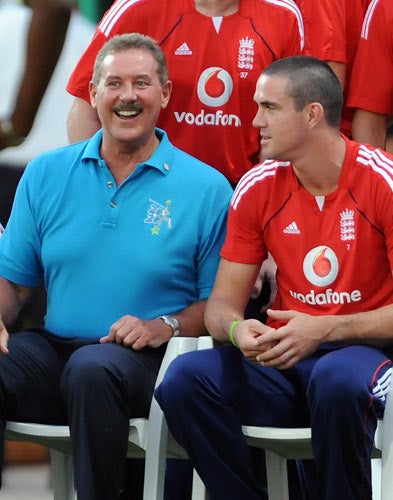James Lawton: What possessed the sport to embrace a man like Stanford?

Your support helps us to tell the story
From reproductive rights to climate change to Big Tech, The Independent is on the ground when the story is developing. Whether it's investigating the financials of Elon Musk's pro-Trump PAC or producing our latest documentary, 'The A Word', which shines a light on the American women fighting for reproductive rights, we know how important it is to parse out the facts from the messaging.
At such a critical moment in US history, we need reporters on the ground. Your donation allows us to keep sending journalists to speak to both sides of the story.
The Independent is trusted by Americans across the entire political spectrum. And unlike many other quality news outlets, we choose not to lock Americans out of our reporting and analysis with paywalls. We believe quality journalism should be available to everyone, paid for by those who can afford it.
Your support makes all the difference.The charge against the man who earlier this year was feted at Lord’s as the saviour of cricket, and was paraded around the old place with his chest of what may now prove to be distinctly dubious dollars, is alleged to be of shocking magnitude.
Sir Allen Stanford should not, however, be the only one heading for the dock. Not, anyway, if the court of public opinion can make an indictable offence of extreme irresponsibility by those who are entrusted with running the game once described as the foundation of the British Empire.
In the wake of yesterday’s statement by the US Securities and Exchange Committee, the England Cricket Board was naturally quick to say that they had run exhaustive checks on the Texas billionaire who lured the England team to a circus of Twenty20 pyjama cricket in the Caribbean in November. Stanford was rebuked for the tacky quality of his competition, and also for the “inappropriate” attention he paid to wives and girlfriends of the team.
However, such concerns did not prevent the ECB and the West Indian Cricket Board ruling body from maintaining close links with a man who has made public his “hatred” of Test cricket. Yesterday, negotiations for a massive sponsorship deal were, naturally, frozen, but not before a huge question was raised in the minds of many British sports-lovers.
It could be framed bluntly enough: Does anyone really care how much national sport is sold off – and to whom?
Ironically the latest disaster for ECB public relations comes just a few days after the one man to stand against reigning chairman Giles Clarke and his policies, the former Conservative treasurer and MCC member Lord Marland, decided to withdraw his candidacy. He did so not because he felt the need for a breath of fresh air at Lord’s had in any way lessened during the course of his brief and passionately argued campaign. No, it was because a third of the English counties who vote into power the game’s administrators decided that they were perfectly content with the current leadership.
This was despite the embarrassing meltdown evident in the sacking of England team captain Kevin Pietersen and coach Peter Moores, and the continued dalliance with Stanford and his uncharted billions.
Now the unchallenged status of Clarke is casting fresh doubt about the ability of English sport properly to administer itself.
In a Premier League of football so heavily colonised by foreign investment there is something described touchingly as the “fit and proper persons” tests. This, in theory, is supposed to run a vigorous |examination of the suitability of potential owners of English clubs.
Some critics believe that Russian oligarch Roman Ambramovich’s whirlwind takeover of Chelsea was swept through with insufficient attention to the source of his wealth. The worry was redoubled when Thaksin Shinawatra, former prime minister of Thailand, was welcomed as owner of Manchester City despite the fact that he faced charges of financial misconduct back in Bangkok and the criticism of human rights groups, including Amnesty.
Objections to the move were dismissed by the Premier League, many supporters of the famous old club and the chief executive Garry Cook, who announced that Shinawatra was a good man with whom to share a round of golf.
Similarly dismissive noises were made in cricket when some traditionalists objected to the vulgarity of Stanford’s arrival at Lord’s in a helicopter bearing his great chest of neatly piled and seductive dollars.
There was an obligation to move with the times, the critics were told. Twenty20 generated vast revenue in India, it was the future. Stanford was seen as English cricket’s ally against the growth of the Indian cricket empire. No matter that the subtleties of the game may be beyond him, that the meaning of cricket’s past was of no consequence. He had what everyone wanted. He had oodles of money.
That, despite the third-rate nature of his cricket circus, meant he was not a man to be discounted when the future of the game was weighed.
Yesterday’s freezing of his assets, and announcement of his impending prosecution, provoked a degree of reappraisal. Stanford was suddenly, and for the foreseeable future, not a man to be courted. He was a huge embarrassment. But then where did the shame, from the perspective of English cricket, really lie?
It was, surely, with those who embraced him with no more restraint than the cargo worshippers who waited to see what the tide would bring. English cricket knows now. It is the latest evidence that cricket may have put a price on everything – and quite forgotten the value of its own integrity.
Join our commenting forum
Join thought-provoking conversations, follow other Independent readers and see their replies
Comments